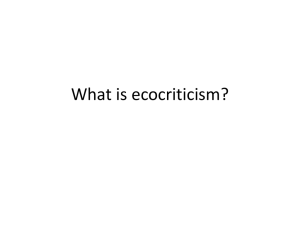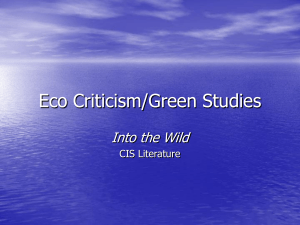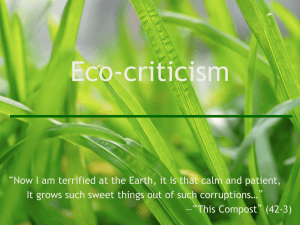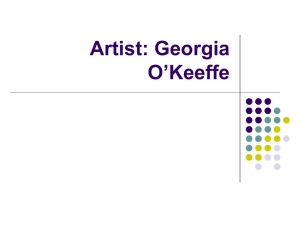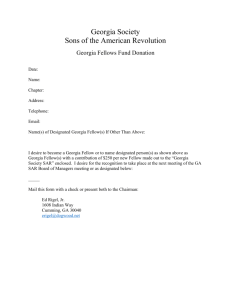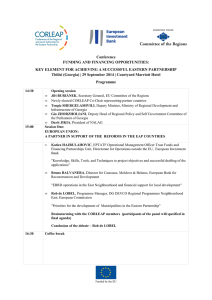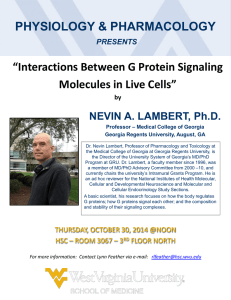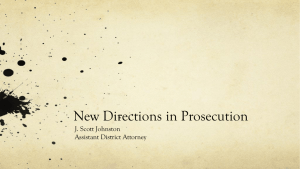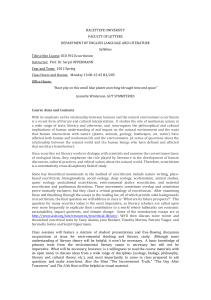Seminar in Cultural Theories and Practice
advertisement
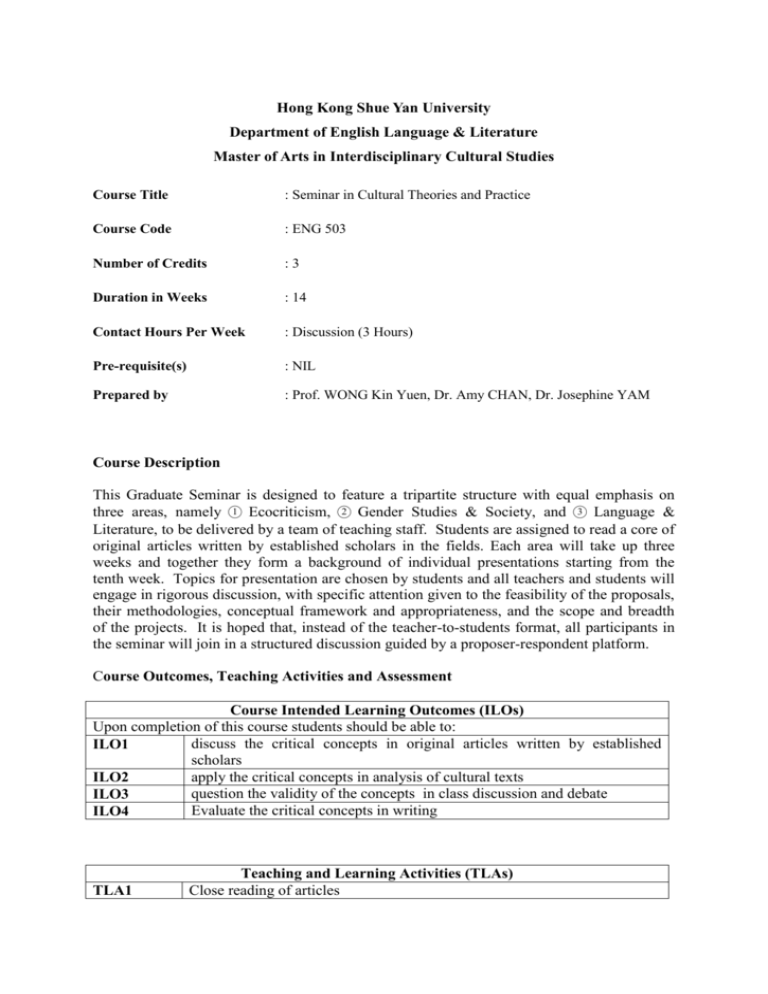
Hong Kong Shue Yan University Department of English Language & Literature Master of Arts in Interdisciplinary Cultural Studies Course Title : Seminar in Cultural Theories and Practice Course Code : ENG 503 Number of Credits :3 Duration in Weeks : 14 Contact Hours Per Week : Discussion (3 Hours) Pre-requisite(s) : NIL Prepared by : Prof. WONG Kin Yuen, Dr. Amy CHAN, Dr. Josephine YAM Course Description This Graduate Seminar is designed to feature a tripartite structure with equal emphasis on 1 Ecocriticism, ○ 2 Gender Studies & Society, and ○ 3 Language & three areas, namely ○ Literature, to be delivered by a team of teaching staff. Students are assigned to read a core of original articles written by established scholars in the fields. Each area will take up three weeks and together they form a background of individual presentations starting from the tenth week. Topics for presentation are chosen by students and all teachers and students will engage in rigorous discussion, with specific attention given to the feasibility of the proposals, their methodologies, conceptual framework and appropriateness, and the scope and breadth of the projects. It is hoped that, instead of the teacher-to-students format, all participants in the seminar will join in a structured discussion guided by a proposer-respondent platform. Course Outcomes, Teaching Activities and Assessment Course Intended Learning Outcomes (ILOs) Upon completion of this course students should be able to: discuss the critical concepts in original articles written by established ILO1 scholars apply the critical concepts in analysis of cultural texts ILO2 question the validity of the concepts in class discussion and debate ILO3 Evaluate the critical concepts in writing ILO4 TLA1 Teaching and Learning Activities (TLAs) Close reading of articles TLA2 TLA3 TLA4 TLA5 TLA6 AT1 AT2 AT3 AT4 AT5 Class discussion Oral presentation Response to oral presentation Research paper presentation Research paper Assessment Tasks (ATs) In-class discussion Students are to respond actively to specific questions made by the lecturer as well as participate in class discussion in either in lecture or tutorial. Oral presentation Students are to take turn to deliver oral presentation on the assigned readings and lead discussion. Response to oral presentation Students are assigned to respond to an oral presentation. They are to comment on the presentation and raise questions which demonstrate their understanding of the topic. Research paper presentation Students are to deliver an oral presentation of paper thesis and outline. Research paper Students are to write a research paper which can demonstrate a solid grasp of issue(s) and concept(s) taught in the course. Students have to formulate a specific question and adopt a problem-solving approach which can demonstrate their ability of critical thinking and analysis. TOTAL 10% 20% 10% 20% 40% 100% Alignment of Course Intended Learning Outcomes, Teaching and Learning Activities and Assessment Tasks Course Intended Learning Teaching and Learning Assessment Tasks Outcomes Activities ILO1 TLA1,2,3 AT1,2 ILO2 TLA5,6 AT4,5 ILO3 TLA2,3,4 AT3,4,5 ILO4 TLA5 AT6 Course Outline PART A Ecocriticism Week 1 Bate, Jonathan. (2000) The Song of the Earth. Cambridge: Harvard University Press. pp. 94-175; 205-242; 293-302; 306-311. Week 2 Howarth, William. (1996) “Some Principles of Ecocriticm.” The Ecocriticism Reader. Ed. Cheryll Glotfelty and Harold Fromm.Georgia: University of Georgia Press. pp.69-91. Manes, Christopher. (1996) “Nature and Silence.” The Ecocriticism Reader. Ed. Cheryll Glotfelty and Harold Fromm. Georgia: University of Georgia Press. pp.15-29. Love, Glen A. (1996) “Revaluing Nature: Toward an Ecological Criticism.” The Ecocriticism Reader. Ed. Cheryll Glotfelty and Harold Fromm. Georgia: University of Georgia Press. pp. 225-240. Percy Bysshe Shelley, “Mont Blanc” John Keats, “Ode to a Nightingale,” “To Autumn” Thomas Hardy, “She Hears the Storm” Week 3 Campbell, Sueelee. “The Land and Language of Desire: Where Deep Ecology and Poststructuralism Meet.” The Ecocriticism Reader. Ed. Cheryll Glotfelty and Harold Fromm. Georgia: University of Georgia Press. pp. 124-136. Norwood, Vera L. (1996) “Heroines of Nature: Four Women Respond to the American Landscape.” The Ecocriticism Reader. Ed. Cheryll Glotfelty and Harold Fromm. Georgia: University of Georgia Press. pp. 323-250. Kolodny, Annette. (1996) “Unearthing Herstory: An Introduction.” The Ecocriticism Reader. Ed. Cheryll Glotfelty and Harold Fromm. Georgia: University of Georgia Press. pp. 170-181. Sarah Ome Jewett, “A White Heron” Ursula K. LeGuin, “The Bones of the Earth,” from Tales from Earthsea PART B Gender Studies & Society Week 1 Sexuality and Body Irigaray, Luce. (1985) “This Sex Which Is Not One,” “When Our Lips Speak Together.” This Sex Which Is Not One. Trans. Catherine Porter. Ithaca & New York: Cornell University Press. pp. 23-33, 205-218. Butler, Judith. (1993) “Bodies That Matter.” Bodies That Matter. New York & London: Routledge. pp. 27-56. Helen Chasin’s “The Word Plum” Excerpts from Lewis Carroll’s Alice in Wonderland Week 2 Gender and Society hooks, bell. (2000) “Feminism: A Movement to End Sexist Oppression,” “The Significance of Feminist Movement,” “Feminist Movement to End Violence,” “Ending Female Sexual Oppression,” “Feminist Revolution: Development Through Struggle.” Feminist Theory: From Margin to Center. London: Pluto Press. pp. 18-42, 117-132, 148166. Marge Piercy’s “The Barbie Doll” Anne Sexton’s “Cinderella” Week 3 Body and Writing Cixous, Hélène. (1997) “The Laugh of the Medusa.” Feminism: An Anthology of Literary Theory and Criticism. Revised edition. Eds. Robyn R. Warhol and Diane Price Herndl. New Brunswick & New Jersey: Rutgers University Press. pp. 347-362. Jones, Ann Rosalind. (1997) “Writing the Body: Toward an Understanding of l’Écriture feminine.” Feminism: An Anthology of Literary Theory and Criticism. pp. 370-383. Homans, Margaret. (1997) “’Women of Color’ Writers and Feminist Theory.” Feminism: An Anthology of Literary Theory and Criticism. pp. 406-429. Excerpts from Hélène Cixous’ The Third Body Excerpts from Monique Wittig’s The Lesbian Body PART C Language & Literature Week 1: Structural Analysis of Language in Literature Jakobson, R. (1962). Selected Writings. The Netherlands: Mouton de Gruyter. pp.3-51;87-97. Jakobson, R.; Pomorska, K. and Rudy, S. (eds.). (1985). Verbal Art, Verbal Sign, Verbal Time. Minneapolis: University of Minnesota Press. pp.11-36;69-110. Week 2: Sound Patterns and Signs in Literature Culler, J. D. (1986). Ferdinand de Saussure. N.Y. Cornell University Press. pp.105-122. Jakobson, R. ,and Waugh, L. R. (2002). The Sound Shape of Language. Berlin ; New York : Mouton de Gruyter. pp.181-197; 208-219; 233-240. Reference: Sipho Sepamla’s “Words, Words, Words” Week 3: Linguistic Forms, Discourse Structures and Literary Effects Bednarek. M. Expressivity and televisual characterization. Language and Literature. February 2011, 20: 3-21. Dorst, A. G. Personification in discourse: Linguistic forms, conceptual structures and communicative functions. Language and Literature. May 2011 20: 113-135. Toolan, M. (1998). Language in Literature: an Introduction to Stylistics. London; New York : Arnold. pp.136-161. Course Implementation Students will be divided into three small groups. Each group will start with a different area. For example, Group 1 will start with Part A, Group 2 Part B and Group 3 Part C. They will switch to another part after 3 weeks. Since the format of the course is a graduate seminar, there will be no lectures. Instructors will be the facilitators in the discussion. Students will take turn to lead the discussion on the reading materials. Each student will probably take up this role for no more than one time in each part. All students will come together for the project presentation starting from Week 10. Students are required to deliver the proposal and outline of their research paper in a 15-minute oral presentation. All students are expected to participate in The topics in all three parts have been introduced to students in both the core and elective courses in this programme. Students are assigned to read the secondary sources in those courses. It is the aim of this graduate seminar to train students to read original articles written by established scholars in the fields. Nevertheless, the topics will not be completely new to students and that explains why students are expected to write a research paper of substantial length and depth after enrolling in this seminar. Primary Texts PART A Bate, Jonathan. (2000) The Song of the Earth. Cambridge: Harvard University Press. Glotfelty, Cheryll & Fromm, Harold, eds. (1996) The Ecocriticism Reader. Georgia: University of Georgia Press. PART B Butler, Judith. (1993) Bodies That Matter. New York & London: Routledge. hooks, bell. (2000) Feminist Theory: From Margin to Center. London: Pluto Press. Irigaray, Luce. (1985) This Sex Which Is Not One. Trans. Catherine Porter. Ithaca & New York: Cornell University Press Warhol, Robyn R. & Herndl, Diane Price, eds. (1997) Feminism: An Anthology of Literary Theory and Criticism. Revised edition. New Brunswick & New Jersey: Rutgers University Press. PART C Jakobson, R. (1962). Selected Writings. The Netherlands: Mouton de Gruyter. Jakobson, R. and Waugh, L. R. (2002). The Sound Shape of Language. Berlin ; New York : Mouton de Gruyter. Toolan, M. (1998). Language in Literature: an Introduction to Stylistics. Supplementary Texts PART A Garrard, Greg. (2011) Ecocriticism. 2nd edition. London & New York: Routledge. Coupe, Laurence. (2000) The Green Studies Reader: From Romanticism to Ecocriticism. London & New York: Routledge. Morton, Timothy. (2010) The Ecological Thought. New York: Harvard University Press. PART B Butler, Judith. (2006) Gender Trouble. New York & London: Routledge. Cixous, Hélène. (1992) “Coming to Writing” and Other Essays. Ed. Deborah Jenson Trans. Sarah Cornell. Cambridge: Harvard University Press. Davidson, Maria del Guadalupe & Yancy, George, eds. (2009) Critical Perspectives on bell hooks. New York & London: Routledge. Freedman, Estelle, ed. (2007) The Essential Feminist Reader. New York: Random House. Gamble, Sarah, ed. (2001) The Routledge Companion to Feminism and Postfeminism. New York & London: Routledge. hooks, bell. (1999) Wounds of Passion: A Writing Life. New York: Henry Holt and Company. Jones, Rachel. (2011) Irigaray: Towards a Sexuate Philosophy. Cambridge & Malden: Polity. Salih, Sara, & Butler, Judith, eds. (2004) The Judith Butler Reader. Malden: Blackwell. Sellers, Susan, ed. (1994) The Hélène Cixous Reader. London & New York: Routledge. Shiach, Morag, ed. (1999) Feminism & Cultural Studies. New York: Oxford University Press. Whitford, Margaret. (1999) The Irigaray Reader: Luce Irigaray. Malden & Oxford: Blackwell. PART C Bednarek. M. Expressivity and televisual characterization. Language and Literature. February 2011, 20: 3-21. Culler, J. D. (1986). Ferdinand de Saussure. N.Y. Cornell University Press. Dorst, A. G. Personification in discourse: linguistic forms, conceptual structures and communicative functions. Language and Literature. May 2011 20: 113-135. Jakobson, R.; Pomorska, K. and Rudy, S., eds. (1985). Verbal Art, Verbal Sign, Verbal Time. Minneapolis: University of Minnesota Press. Fabb, Nigel. (1997). Linguistics and Literature. Oxford: Blackwell. Fabb, Nigel. (2002). Language and Literary Structure: the Linguistic Analysis of Form in Verse and Narrative. Cambridge and New York: Cambridge University Press. Academic Honesty You are expected to do your own work. Dishonesty in fulfilling any assignment undermines the learning process and the integrity of your college degree. Engaging in dishonest or unethical behavior is forbidden and will result in disciplinary action, specifically a failing grade on the assignment with no opportunity for resubmission. A second infraction will result in an F for the course and a report to College officials. Examples of prohibited behavior are: Cheating – an act of deception by which a student misleadingly demonstrates that s/he has mastered information on an academic exercise. Examples include: Copying or allowing another to copy a test, quiz, paper, or project Submitting a paper or major portions of a paper that has been previously submitted for another class without permission of the current instructor Turning in written assignments that are not your own work (including homework) Plagiarism – the act of representing the work of another as one’s own without giving credit. Failing to give credit for ideas and material taken from others Representing another’s artistic or scholarly work as one’s own Fabrication – the intentional use of invented information or the falsification of research or other findings with the intent to deceive To comply with the University’s policy, all written assignments have to be submitted to VeriGuide.
